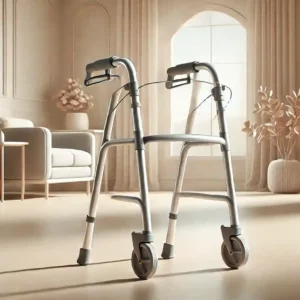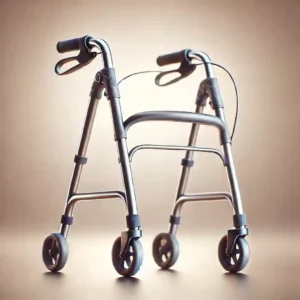
Table of Contents
As seniors age, maintaining mobility and independence becomes increasingly important for their quality of life. Lightweight walkers provide a practical solution, offering support, stability, and ease of use for older adults who need assistance getting around. This blog post explores the benefits, features, and top options for lightweight walkers for seniors, helping you make an informed decision for yourself or a loved one.
Why Choose Lightweight Walkers for Seniors?
Lightweight walkers are specifically designed to be easy to maneuver, portable, and comfortable for seniors. Here are some key benefits:
Ease of Use
Lightweight frames reduce the effort required to push and lift the walker, making them ideal for seniors with limited strength or mobility issues. Seniors often struggle with heavier devices, and lightweight walkers help preserve energy for other activities.
Portability
These walkers are easier to fold and transport, fitting easily into car trunks or storage spaces. Seniors who frequently visit family, attend medical appointments, or travel benefit greatly from this feature.
Safety
They offer stability, reducing the risk of falls and providing confidence for seniors to move independently. Falls are one of the leading causes of injuries in older adults, and a reliable lightweight walker minimizes this risk significantly.
Versatility
Many lightweight walkers come with added features like seats, storage compartments, and adjustable handles to meet various needs. They adapt well to indoor and outdoor environments, offering the flexibility seniors require.
Types of Lightweight Walkers
There are several types of lightweight walkers available, each suited to different mobility needs. Understanding these types helps you choose the right option:
1. Standard Lightweight Walkers
- Description: These walkers have no wheels and provide maximum stability.
- Use Case: They’re ideal for indoor use or short distances. They’re also ideal for seniors needing extra balance support but who don’t require frequent movement.
2. Two-Wheel Walkers
- Description: Equipped with two front wheels to assist with forward movement while the back legs remain stationary.
- Use Case: Seniors needing a balance of stability and mobility. They’re perfect for those transitioning from a standard walker.

3. Rollators (Four-Wheel Walkers)
- Description: These feature four wheels, brakes, and a built-in seat for rest breaks.
- Use Case: Rollators are ideal for seniors who need frequent rest breaks or travel longer distances. They also offer the convenience of larger storage compartments.
4. Foldable Walkers
- Description: Designed for portability, these walkers fold easily for storage and transport.
- Use Case: Seniors with active lifestyles or limited storage space.
Key Features to Look For in Lightweight Walkers
When selecting a lightweight walker, consider the following features to ensure it meets the user’s needs:
Weight
Opt for a walker that is light enough to lift and maneuver comfortably. Most lightweight walkers weigh between 5 and 15 pounds, striking the perfect balance between portability and durability.
Adjustable Height
Look for walkers with adjustable handles to ensure proper posture and reduce strain on the back and wrists. Poor posture while using a walker can lead to long-term discomfort or health issues.
Durability
Choose a walker made from sturdy materials like aluminum, which is both lightweight and durable. Durable construction ensures the walker can withstand regular use without compromising safety.
Wheels and Brakes
For rollators and two-wheel walkers, ensure the wheels roll smoothly and the brakes are easy to operate. Reliable brakes are essential for preventing accidents.
Foldability
A foldable design makes it easier to transport and store the walker. This feature is especially important for seniors who travel frequently or live in smaller spaces.
Comfort Features
Look for padded grips, built-in seats, or backrests for added comfort. Features like these make the walker more user-friendly and reduce fatigue.
Storage Options
Many walkers come with storage bags or baskets to carry personal items conveniently. This feature allows seniors to keep their hands free while walking.

Tips for Using Lightweight Walkers Safely
To get the most out of a lightweight walker, it’s essential to use it correctly. Here are some safety tips:
Adjust the Height Properly
Ensure the walker’s handles are at wrist level when standing upright. This promotes good posture and prevents strain on the back, shoulders, and wrists.
Use Brakes When Stationary
For rollators, always engage the brakes before sitting or standing up. This ensures stability and prevents accidental movement.
Take Small Steps
Move the walker a short distance ahead and step into it, keeping it close for support. Avoid overreaching, as this can affect balance.
Avoid Overloading
Do not overload the storage compartments, as this can affect the walker’s balance and make it harder to maneuver.
Inspect Regularly
Check for loose screws, worn wheels, or other issues that could compromise safety. Regular maintenance ensures the walker remains reliable over time.
Benefits of Lightweight Walkers for Seniors
Lightweight walkers offer numerous advantages that enhance the daily lives of seniors, including:
Increased Independence
Seniors can move around confidently without relying heavily on others. This independence contributes to better mental health and overall well-being.
Improved Mobility
Walkers make it easier to navigate different terrains, both indoors and outdoors. This improved mobility encourages seniors to remain active and engaged in their communities.
Enhanced Safety
With added support and stability, lightweight walkers reduce the risk of falls and injuries. This safety aspect is particularly crucial for seniors recovering from surgeries or managing chronic conditions.
Greater Comfort
Features like seats and padded grips make walking less strenuous, allowing seniors to enjoy longer outings without discomfort.
Portability
Lightweight and foldable designs simplify travel and storage. Seniors can easily take their walker wherever they go, ensuring continuous support.
Additional Considerations When Choosing a Walker
Cost and Insurance
Some lightweight walkers may be covered by Medicare or private insurance if deemed medically necessary. Check with your provider to explore coverage options.
Consult a Professional
Consulting a physical therapist or medical professional can help determine the best walker for your specific needs. They can provide valuable insights into features and proper use.
Try Before You Buy
If possible, test the walker in-store to ensure it’s comfortable and easy to use. Many retailers offer trial periods or return policies for added peace of mind.
Call to Action
Ready to improve your mobility or help a loved one stay active? Explore our top picks for lightweight walkers for seniors and find the perfect fit today! Don’t wait—enhance comfort, safety, and independence now!
Final Thoughts
Choosing the right lightweight walker for seniors can make a significant difference in their mobility and quality of life. By considering factors such as weight, adjustability, and additional features, you can find a walker that perfectly suits your needs or those of a loved one.
Whether it’s a rollator with a comfortable seat or a compact foldable walker, the options are endless. Prioritize safety, comfort, and ease of use to ensure the walker becomes a reliable companion in maintaining independence.
If you found this guide helpful, share it with others who might benefit from learning about lightweight walkers for seniors. Staying mobile has never been easier with the right tools at your side.
FAQ Section
1. What are lightweight walkers for seniors, and why are they beneficial?
Lightweight walkers for seniors are mobility aids designed to provide stability and support while being easy to maneuver and carry. They are beneficial because they reduce strain on the user, improve mobility, and are convenient for travel and storage.
2. How much does a lightweight walker typically weigh?
Most lightweight walkers for seniors weigh between 5 to 15 pounds, depending on the materials and features. Aluminium walkers are popular for being both sturdy and lightweight.
3. Are lightweight walkers safe for seniors with limited mobility?
Yes, lightweight walkers are designed to ensure safety for seniors with limited mobility. Many come with non-slip grips, sturdy frames, and optional accessories like hand brakes for enhanced control.
4. What features should I look for in a lightweight walker for seniors?
Look for adjustable height settings, durable yet lightweight materials, easy folding mechanisms, and optional accessories like a seat, storage pouch, or wheels for added convenience.
5. Do lightweight walkers for seniors come with seats?
Yes, many lightweight walkers for seniors come with built-in seats, allowing users to rest when needed. These are often referred to as rollators and are ideal for seniors who need to take breaks during walks.
6. Can a lightweight walker support heavier seniors?
While lightweight walkers are designed for ease of use, they often have weight limits. Many can support up to 250–300 pounds, but bariatric models are available for those needing higher weight capacities.
7. How do I choose the best lightweight walker for a senior loved one?
To choose the best lightweight walker, consider the senior’s mobility needs, weight capacity, adjustability, and portability. Reading reviews and consulting a healthcare professional can also help in making the right decision.
8. Are lightweight walkers covered by Medicare or insurance?
Yes, Medicare Part B and some insurance plans may cover the cost of lightweight walkers for seniors if deemed medically necessary. It’s best to check with your provider for specific coverage details.
9. How do I maintain a lightweight walker for longevity?
Regularly check for loose screws, clean the frame with a damp cloth, and ensure that the rubber tips or wheels are in good condition. Proper maintenance will extend the life of the walker.
10. Where can I buy the best lightweight walkers for seniors?
Lightweight walkers for seniors can be purchased at medical supply stores, online retailers like Amazon, or through healthcare providers. Look for reputable brands with positive reviews to ensure quality.



